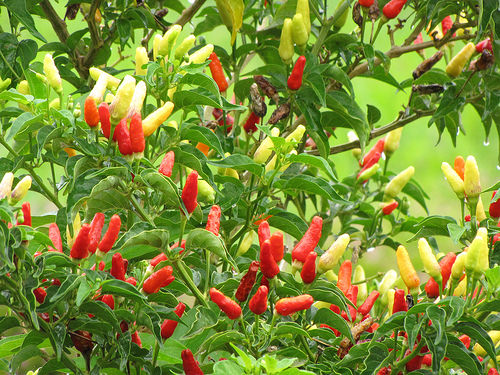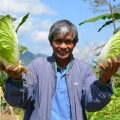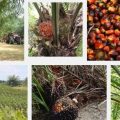Even as a little kid, his greatest ambition is to become a renowned doctor but he found his wealth in farming.
Packed with adventure and adversity, Mr. Michael Dacles, is a living testament to persistence, hard work and power of hope. Today, he is considered the champion “sili” grower in Mansalay, Oriental Mindoro for being one of the suppliers of chili pepper in the province and remarkably earning a million pesos out of it.

It gets in his blood
Michael comes from a family of professionals. He finished his course in Business Administration major in Agribusiness from De La Salle University in Dasmariñas, Cavite. Likewise, all his siblings have bachelor degrees on their chosen field of specialization. His mother is a registered nurse and his father is an agribusiness graduate. Despite being born to a well-off family, their parents trained them in the farm.
“Since childhood we are hands-on in the farm. Aside from the farm workers that my parents hired for farm labor especially during planting season, our parents also involved us in farm activities. We were employees in our own farm.” Michael says. According to him, their parents are preparing them not only to become a farmer but also to become an agri-preneur.
“After graduation, I rejected the job offer of other companies in Metro Manila because I want to work in my parent’s farm. No matter what your profession is, being a farmer is a very fulfilling job.” he adds.
Honing One’s Skills
According to him, he has background in agriculture because he grew up in the farm. However, joining in the Farmers Scientist Training Program (FSTP) spearheaded by the Agricultural Training Institute (ATI) MiMaRoPa in 2011gave him additional knowledge in farming. “It was really a big help for me because I learned a lot in the program. Definitely I was able to apply these learnings in my own farm. We were taught not only the theories of farming but also its actual application.” Michael declares.
“The FSTP lasted for four months. The program was divided into three phases. During Phase I, we were taught on the new techniques and principles in farming from cultural management to its harvest and post-harvest management. We were planting corn in the field and we took care and monitored these using the methods that we have studied. In Phase II, we were practicing what we have learned in our own farm. Based on what we have practiced, in Phase III, we shared our know-hows and trained other farmers on the modern techniques in Agriculture especially in corn farming.” he narrates.
He said that the FSTP focused on corn production but its farming systems are applicable to any type of commodity. Aside from corn, he also attended training on high value vegetables production in Nasukob, Bulalacao, Oriental Mindoro and training on onion production in San Mariano, Roxas, Oriental, Mindoro in October 2012. These trainings capacitated him to become an effective and efficient farmer. “Aside from the learning that I gained in the FSTP and in the seminars/trainings I attended, I also met different farmers which I learned additional knowledge from talking to them and observing on their respective farms. Until now, if we have available time, we conduct meetings every once in a while.” Michael declares.
How He Started
After he earned his baccalaureate, Michael wanted to teach in Mansalay Divine Light Academy, a missionary school administered by his father, Nonito Dacles. Instead of teaching, the financial management of the school was entrusted to him by his father. Michael took charge the disbursements and other funds of the school. “Since my father focused on preaching, I acted as director of the school for three years.” he explains.
“The time when I was the director, we hired professional teachers to meet the educational needs of 100-120 students. It does not mean that if you are running a school, you will make a profit out of it. Since it was a missionary school, it came to the point that the school had a problem in financing the salary of the teachers. We did everything to save the school. We used the profit that we earned in farming to solve the problem but in the end it was not enough to sustain the operation. The reason why in 2010, the school was closed.” he affirms.
“As they say, life is like a wheel, sometimes you’re at the top, sometimes you’re at the bottom. However, the situation never discouraged my parents, instead they converted the school into a 15-hectare farm.” Michael says. According to him though the land title was not named after their parents, they have full authority to cultivate it. He said that the farm is a source of income for most people living in the place. “Helping them is one of our priorities, not only on the financial aspect but also by improving their full potential to become productive farmers.” he adds.
Despite having white-collar jobs, Michael’s siblings resigned from their respective employment because they see farming as a business opportunity. Their parents allotted more than one hectare to each one of them. “Even though we have our own part of the land, we consider our produce as one. The harvest and income of one, is the harvest and income of all.” he proclaims.
Michael used to grow corn in his own farm. It was easy for him to grow this crop since he attended training from ATI. At first he was very positive to earn a lot in growing sweet corn. His target market were elementary and high school students because they are the large consumers of this commodity. He said that in terms of corn production, his more than one hectare farm could supply its demand but they have a problem with the marketing strategy. According to him, sweet corns easily get spoiled before it could reach to all school canteens in the province and it priced him so much.
“At first, it is hard to earn higher income from farming but through hard work and determination, you will increase your profit eventually. If you love what you are doing, everything follows.” he proclaims.
When He Ventures Into “Sili” Farming
Despite his rough start in farming, Michael never gave up. “I have to tell you, this is a big problem for farmers. If they lost one this year, they stop. To become successful, they should continue what they are doing.” he says. In 2012, he tried planting “sili” in his farm. He started again from hiring farmhand to work on his farm from tilling the land up to planting season. He said that he chose “sili” because aside that it requires less attention, it has also high resistance to pests and diseases.
During the first year of “sili” farming, Michael used all the technology that he has and applied the knowledge that he gained on the training that he attended. He hired three regular farm workers to help him in the farm activities like watering the “sili” plants and weeding the field. He also hired three farm workers for a daily basis in which these farmers would work twice a week if needed. “These people that I hired are our “katutubo” [Mangyan]. This is to give them employment. I helped them not only for them to earn money but I also trained them to become a competent farmer.” he says.
According to him, all his farm worker are hands-on in the farm. Michael believes that when he teaches them the right technology in farming, they could grow more food and earn more income. In this way, they are better able to feed their families. Because his main priority is to generate job in his town place, during harvest, he hires people to pick the ripe chili pepper in the farm.
When he discovered “sili” as one of the profitable crop, especially if the timing of planting and harvest is perfect, he also encouraged his siblings to indulge into “sili” farming. “Now, I produce chili pepper in partnership with my siblings. We hired 50-70 “sili” picker on its harvest season.” he adds.
Earning Money
Michael proves that there is money in “sili” farming if the plant will be properly and sufficiently fertilized. He said that “sili” farmers can earn more because they can harvest from one cropping 35 to 45 times. On his first year of planting, Michael’s farm had a bumper harvest and earned a very good price. From more than one hectare, Michael said that they have harvested not less than 800 kilos per harvest. They were able to sell the harvests at P80-90 per kilo. That’s a gross of P1 million with a net income of P700,000.00 in a matter of less than four months.
The second year of planting has been most profitable in his farm. “We had plenty harvest. The planting time was perfect because when we started harvesting, the price was P150-300 per kilo.” Michael states. This time his farm had a gross of P2 million with a net income of P1.5 million. However, his third year of planting was breakeven. His farm grossed P500,000.00 with a net income of P300,000.00.
For his three years focusing on chili pepper production, Michael’s farm provides livelihood to a lot of workers. More than a hundred people earned their living by doing various chores in the farm, including planting, fertilizing, spraying, harvesting and the like. “Ang pera ay hindi mahalaga sa akin, dahil sa totoo lang ang pera ay umiikot lang sa farm. Ang mahalaga ay marami akong natutulungan na tao [I do not do it for money. What matters most is how I was able to help and touch other people].” he states.
A Man With a Big Heart
According to him, his most lasting and fulfilling achievement is often earned by helping others fulfill theirs. Out of his earnings from his farm, Michael supported the studies of one of his regular farm worker. He shouldered all the school expenses (tuition fee, food and travel allowance) of John Paul Roxas, 29 years old from Mangyan tribe. John who dreams to become a businessman is now one step away to his sweet success for he has already finished his course in Business Administration at John Paul College.
“I want to witness other people especially our “katutubo” to succeed in life. If they want to become professionals or to have their own diploma, I am with them all the way.” he expresses. Aside from John, Michael is also helping other farm workers by providing them not only monthly salary but also rice allowance.
Setting an example
“It is not his money that makes him the best to his farm workers, but the real reason he’s the best is because he has a huge heart.” Ariel Masid attests. Ariel is one of the regular farm worker of Michael who witnesses his good deeds. He said that Michael teaches them all his knowledge in farming. “Hindi siya madamot sa kanyang nalalaman, lahat ng makabagong pamamaraan sa pagsasaka ay itinuro niya sa amin. Pati sa pera hindi din siya madamot, kung anong meron siya, meron din kami. Kung ano kinakain niya, ganon din sa amin [He is not selfish. He imparted his knowledge in modern farming and even shares his financial resources to us. What he has, we also have].” Ariel adds.
According to another farm worker, Julius Gonzalez, Michael teaches them to become independent and skilled farmer. He said that they are hands-on in the farm activities because this is the only way to learn properly. “Ang nagustuhan ko rin kay Sir Michael ay hindi niya kami itinuturing na empleyado. Mga kapatid ang turing niya sa amin. Kaya hindi na ako naghahanap ng iba pang mapapasukan dahil satisfied na ako dito.” [What I like about Sir Michael is he considers us as siblings, not as an employee. This is the reason why I did not seek for other job because I am already satisfied here].”Julius declares.
Advice to Farmers
“As what I observed, most of the farmers are hopeless. If they want to increase their production and earn more, they need to be serious in farming. We have a lot of technologies out there, why not apply it instead of using the traditional methods.” Michael says. He said that farmers do not earn more because they usually have low self-esteem and they discouraged themselves.
“Huwag gayahin ng ibang magsasasaka kung ano ang itinanim nila. Dapat magtanim tayo ng crop na in demand. Sa pagsasaka kailangan ang perfect timing. Kailangan kung nagtanim ka ngayon, dapat pag mag harvest ka malaki ang presyo nito sa merkado para malaki ang kikitain mo [Do not imitate other farmers of what they are planting in their respective farm. We should plant crop that is in demand. In farming, perfect timing in planting is also very important. Be sure that during harvest, the crop that you have planted has a higher market price to have more profit].” he adds.
Future Plan
Michael likes to invest on the value added products of ‘sili’. He wants to build a factory for chili pepper powder in Mansalay to expand its marketability and to generate job in the place. “To date, I am still looking for a support from the government or any agency who is willing to provide funds to make it realize. To tell you frankly, I can’t afford to do it alone.” he says.
Now at the age of 35, Michael with his family lives a simple life. “If the basis of success story are the material things, sorry to tell you, I don’t have those things.” he states. For him, success is not measured by the material things, it is measured by what’s in your heart and what makes you a better person.
by Erlan Pasana, ati.da.gov.ph/mimaropa






